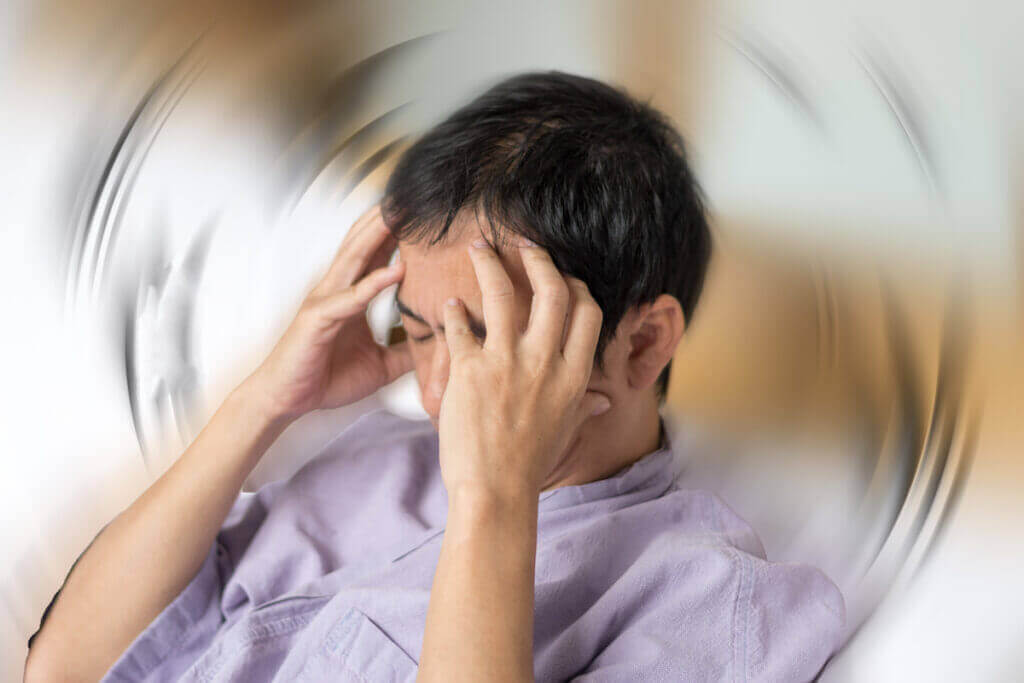Vestibular migraine has also been called migraine-associated vertigo/dizziness, migraine-related vestibulopathy and migrainous vertigo. Vestibular migraines are not as common as other headache and migraine conditions, but they impact about 3% of the population. They happen five times more often in women than they do in men. One of the common themes among vestibular migraine sufferers is that this condition is often found in their family history, and often, these people have a history of migraines. An early clue can be that they may have gotten easily car sick as a child, and they may still as an adult.
Dizziness, lightheadedness, and wooziness are very common symptoms associated with regular migraine attacks. Vestibular migraines cause severe dizziness, vertigo, imbalance, and disequilibrium in people with migraines. The severity of these symptoms in vestibular migraine are much more severe and pronounced as compared with the more commonly associated milder dizziness type of symptoms often seen with normal migraine attacks. In addition, with vestibular migraine, you might not always have a headache with the symptoms, which can make diagnosis even more tricky. So, let’s dissect the specifics and symptoms of vestibular migraine a bit more below…
What Types of Symptoms Might I Experience With a Vestibular Migraine?
As mentioned above, vestibular migraines don’t always coincide with a headache. They include dizziness that lasts for a few moments or more, nausea, vomiting, balance problems, sensitivity to motion when you move your body, disorientation, and sensitivity to light or sound. Vestibular migraines are connected to the inner ear, so a person experiencing this type of migraine will have significant issues with their balance and equilibrium during an attack.
The International Classification of Migraine 3rd Edition (ICHD3) has specific criteria that must be met to fit the diagnosis. Other causes of vestibular symptoms such as inner ear problems and other causes must have been tested for and excluded. The person must have a history of migraine without aura or migraine with aura. They must have at least 5 episodes of moderate to severe vestibular symptoms lasting between 5 minutes to 72 hours. Vestibular symptoms can include vertigo, spinning sensation, sensation of self-motion, disequilibrium, positional vertigo such as following a change in head position or head motion, dizziness with nausea, and visually induced vertigo triggered by a moving visual stimulus. At least half of these vestibular symptom episodes must be associated with 1 of the following 3 migrainous features:
1. Headache with at least 2 of the following 4 features:
- One sided location
- Pulsating, throbbing, or pounding pain
- Moderate to severe intensity
- Worsening by physical activity
2. Sensitivity to light (photophobia) and sound (phonophobia)
3. Visual aura
Approximately 1/3rd of patients can have vestibular symptoms lasting minutes, 1/3rd can last hours, and 1/3rd can last several days. A small fraction of patients have vestibular attacks which can last seconds only, but occur repeatedly during head motion, changes in head position, or visual stimulation. In these patients, episode duration is defined as the total period during which short attacks are recurring with these triggers. An even smaller fraction of patients can have attacks that can last several weeks to a month. Overall, attacks last 72 hours or less for the vast majority of patients.
@neuralgroover What is vestibular migraine? Do you feel dizzy, lightheaded, woozy, vertigo, disequilibrium, or imbalanced with a migraine attack? If so, vestibular migraine should be on your radar! #vestibular #vestibularmigraine #vertigo #dizzy #dizziness #lightheaded #lightheadedness #migraine #chronicmigraine #equilibrium #dysequilibrium #disequilibrium #imbalance #headache #trigeminal #MigraineAwareness #CGRP #migrainerelief #migraines #trigeminalnerve #migrainesufferer #headaches #headacherelief #migrainecauses #migrainetriggers ♬ original sound – Virtual Headache Specialist🤯
What Causes Migraines With Vertigo?
The exact cause of vestibular migraines is not clearly understood. However, many researchers believe that there is overlap and erroneous connections between pain signals and vestibular signals that come in from the inner ear and the electrical migraine pathways. Some contributing factors to vestibular migraines include many of the commonly recognized migraine triggers such as lack of sleep, consumption of MSG and certain other foods, and dehydration.
How Long Does a Vestibular Migraine Last?
Vestibular migraines can last for a period as short as 5 minutes or up to 72 hours, as detailed above. Some patients have reported this type of migraine lasting for up to 4 weeks, with the intensity of the symptoms coming and going.
What Types of Treatments Will Help Alleviate Vestibular Migraines?
Different types of abortive therapies are available for vestibular migraines. Abortive migraine medications are medications taken at the onset of the migraine with a goal of lessening the duration and severity of the migraine attack and associated symptoms. Some of these options include NSAIDs, ergots, triptans, neuromodulatory devices, and the gepants (Ubrelvy (Ubrogepant),Nurtec ODT (Rimegepant), Zavspret (Zavegepant)). Triptans and abortives are particularly helpful if they are taken at the first sign of symptoms. Your doctor might prescribe something like Ativan, Valium or another vestibular suppressant to correct the balance on your inner ear, but these should preferably not be taken frequently or daily because they can form dependency and addiction.
Calcium blockers and beta blockers can also work to reduce the severity and intensity of your vestibular migraine, but there are many other migraine preventive options as well. Preventive migraine treatments are used to lessen the frequency and/or severity of migraine attacks. Preventive treatments include a variety of daily pill medications, CGRP monoclonal antibodies (mAbs) (Aimovig (Erenumab), Emgality (Galcanezumab), Ajovy (Fremenazumab), Vyepti (Eptinezumab)), neuromodulation devices, Botox, Gepants (Nurtec or Qulipta), herbal and natural supplements and vitamins, yoga and meditation, and acupuncture and acupressure.
Some of the typical migraine pill preventive medications include antiseizure, blood pressure, and antidepressant drugs. These traditional migraine medications can also be very helpful in treating more severe occurrences of vestibular migraines.
@neuralgroover Replying to @Spinindizzy1 Vestibular migraine explained and vestibular migraine treatments. #vestibular #vestibularmigraine #vertigo #vertigotreatment #vestibularmigraines #dizzinessrelief #dizzy #dizziness #headspinning #ENT #otolaryngology #earnosethroat #earnosethroatdoc #innerear #menieresdisease #menieres #otolaryngologist #lightheaded #lightheadedness #migraine #chronicmigraine #equilibrium #dysequilibrium #disequilibrium #imbalance #headache #trigeminal #MigraineAwareness #CGRP #migrainerelief #migraines #migrainesufferer #headaches #headacherelief #migrainecauses #migrainetrigger #ChronicMigraine #Migraine #Neurology #HeadacheSpecialist #Headachedoc #headachedoctor #headachemedicine #headachetreatment #Neuro #neurologytiktok #neurotok #headache #migrainetreatment #migrainemedicine #MigraineAwareness #migrainerelief #meded #medicaleducation #mededucation #migraines #foryou #fyp #tiktok #foryourpage #explore #trending #learnontiktok #health #wellness #education #migrainesufferer #MigraineWarrior #headaches #migrainesociety #migrainetok #migrainetiktok #neuroscience #neurologist #brain #braindoctor #neurologistsoftiktok #headachetiktok #medical #medicaltiktok #doctorsoftiktok #doctor #physician ♬ original sound – Virtual Headache Specialist🤯
Could My Vestibular Migraine Be Something Else?
Vestibular migraines have symptoms that overlap with other medical conditions. In fact, at least 20% of vestibular migraine cases are misdiagnosed. A condition called Meniere’s disease causes dizziness. This disease, however, will often be accompanied by a stuffed ear sensation or ear ringing. Referral to an ENT doctor (ear nose and throat) to evaluate for inner ear disorders should always be part of the evaluation plan, along with possible neuroimaging with brain MRI or CT, and possibly some blood work. A brainstem stroke can also cause dizziness before more severe symptoms set in. MRIs and other medical tests can help rule conditions like these out. Therefore, vestibular migraine should always be a “diagnosis of exclusion”, meaning it can be considered only after other causes of dizziness and vertigo have been tested for and ruled out.
How Will My Doctor Manage My Vestibular Migraines?
In addition to some of the medications suggested above, there are ways to manage your vestibular migraines. Your doctor will probably do a full medical examination to understand any comorbidities and also see what medications you are currently taking. Dizziness is one of the most commonly reported side effects of many medications, so make sure to trace onset of symptoms back to any medication adjustments as well.
Depression, lack of sleep, and anxiety are some of the issues that may be exacerbated by your vestibular migraines. If these conditions are left untreated, the vestibular migraine will not get better. Depression and anxiety do not cause vestibular migraines, but the migraines can lead to anxiety and depression and these issues can all begin to feed into and fuel one another.
Another thing to keep in mind is that traditional medicinal approaches to headaches may not be the best approach to vestibular migraines for everyone. Vestibular migraines can sometimes be sensitive to Advil, Tylenol, and other NSAIDs. However, most patients will not respond as well to these over the counter medications and will need more migraine specific therapies. If you use triptans or NSAIDs daily or with a high frequency of more than 10 days per month on average, you may be more prone to rebound vestibular migraines. Vestibular physical therapy can also be helpful for some patients if they suffer from a high frequency of symptoms.
What Is the Outlook for Vestibular Migraines?
Overall, the outlook for Vestibular migraines is good. An NIH study found that vestibular migraines in a pool of patients from a period of 10 years decreased in about 56% of cases, increased in only about 30% of people, and stayed the same in about 16 percent of cases.
IF YOU HAVE HEADACHE, MIGRAINE, OR FACIAL PAIN AND ARE LOOKING FOR ANSWERS ON ANYTHING RELATED TO IT, A HEADACHE SPECIALIST IS HERE TO HELP, FOR FREE!
FIRST, LET’S DECIDE WHERE TO START:
IF YOU HAVE AN EXISTING HEADACHE, MIGRAINE, OR FACIAL PAIN DIAGNOSIS AND ARE LOOKING FOR THE LATEST INFORMATION, HOT TOPICS, AND TREATMENT TIPS, VISIT OUR FREE BLOG OF HOT TOPICS AND HEADACHE TIPS HERE. THIS IS WHERE I WRITE AND CONDENSE A BROAD VARIETY OF COMMON AND COMPLEX MIGRAINE AND HEADACHE RELATED TOPICS INTO THE IMPORTANT FACTS AND HIGHLIGHTS YOU NEED TO KNOW, ALONG WITH PROVIDING FIRST HAND CLINICAL EXPERIENCE FROM THE PERSPECTIVE OF A HEADACHE SPECIALIST.
IF YOU DON’T HAVE AN EXISTING HEADACHE, MIGRAINE, OR FACIAL PAIN DIAGNOSIS AND ARE LOOKING FOR POSSIBLE TYPES OF HEADACHES OR FACIAL PAINS BASED ON YOUR SYMPTOMS, USE THE FREE HEADACHE AND FACIAL PAIN SYMPTOM CHECKER TOOL DEVELOPED BY A HEADACHE SPECIALIST NEUROLOGIST HERE!
IF YOU HAVE AN EXISTING HEADACHE, MIGRAINE, OR FACIAL PAIN DIAGNOSIS AND ARE LOOKING FOR FURTHER EDUCATION AND SELF-RESEARCH ON YOUR DIAGNOSIS, VISIT OUR FREE EDUCATION CENTER HERE.


